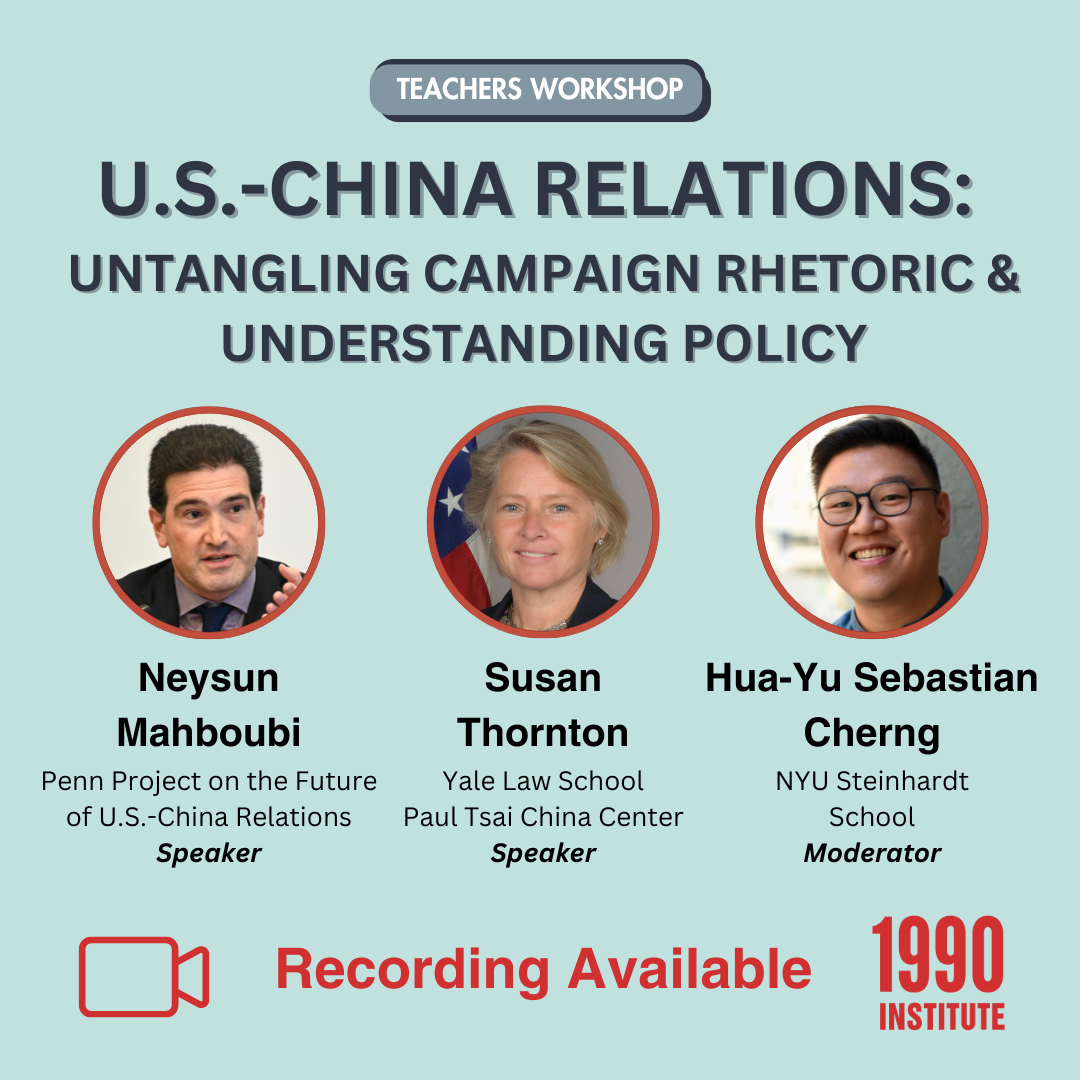| | | | Dear Friends, Political campaigns have and continue to portray China through an adverse lens, affecting decades-long efforts to build constructive relations with national and global implications. At our June 20 Teachers Workshop on this topic, "U.S.-China Relations: Untangling Campaign Rhetoric and Understanding Policy," we were thrilled to see registrations from a diverse audience from 25 states and seven countries, with especially strong representation from CA, NY, WA, TX, and Washington, DC. The feedback has been overwhelmingly positive, and we want to ensure you don't miss out on this valuable opportunity to hear this important conversation. The recording is now available on YouTube and curated resources and lesson plans are in our Reference Library. We were joined by China scholars from Yale Law School, the University of Pennsylvania, and New York University’s Steinhardt School. Our speakers provided context with an overview of the history of U.S.-China relations and then delved into issues affecting this global relationship during this election year, including trade, technology, and Taiwan. Read the following essay and see our Spotlight section below for more information. We rely on individual contributions to sustain and grow our nonprofit programming which supports teachers and students. If you are able to make a charitable contribution of any amount, we would be so grateful to continue our work. Please share our newsletters with your friends and family and encourage them to subscribe. |
| |  |
|
| | | Reflections on the 1990 Institute’s Teachers Workshop on U.S.-China Relations By Denise Yiran Zheng
With the upcoming U.S. presidential election, U.S.-China relations will be one area of focus for political campaigns with possible negative rhetoric concerning China. It will be important for all of us to think critically about political rhetoric and the importance of understanding U.S.-China relations. With that goal in mind, on June 20, the 1990 Institute held a Teachers Workshop titled “U.S.-China Relations: Untangling Campaign Rhetoric and Understanding Policy” with a panel of academic experts. Susan Thornton, a retired senior U.S. diplomat and Senior Fellow at the Yale Law School Paul Tsai China Center, gave an overview of China's relevance in the world, the history and current state of U.S.-China relations, and the main areas of friction between the two countries. She said that the most important relationship that will shape our collective future is the one between the U.S. and China since issues affecting China’s population or “one-fifth of humanity are definitely going to impact all of us.” Some rhetoric is about a possible invasion of Taiwan by China and the United States’ obligation to defend Taiwan. In terms of actual policy, Thornton discussed that the U.S. approach has been to maintain the status quo: neither supporting independence nor forced unification with China. Although some in the media have portrayed forced unification to be imminent, Thornton pointed out that “many experts do not agree with this alarmist timetable and believe that China still wishes to avoid a conflict and a forced unification,” which could lead to a catastrophic military conflict given both countries' nuclear capacities. Thornton suggested that when teachers discuss Taiwan with their students, there is a need to emphasize the importance of continuous dialogues and diplomacy. Neysun Mahboubi, Director of the Penn Project on the Future of U.S.-China Relations, then focused on issues at the core of U.S.-China relations based on a difference in values, including human rights, restrictions on civic space for Chinese activists/journalists, censorship, and surveillance. According to some rhetoric, China's economic strength is attributed to the theft of U.S. intellectual property. However, this distorts China’s development as the second-largest economy in the world, its integration into the international trade system, and its openness to private enterprise. China’s reform and opening-up policies promoted its modernization in the 1990s, and in 2001, China joined the World Trade Organization and accelerated its global exports. Currently, China is a global leader in exports and technology, and has replaced the U.S. as the largest international trading partner. In addition to economic trade wars, media commentators mention a cold war of technology competition related to national security concerns (including discussions on banning TikTok). In terms of political strategy, the U.S. has tried to freeze China’s advancements in sectors such as semiconductors and artificial intelligence. Nevertheless, it is important for the U.S. to not solely perceive China as a competitor but also as a collaborator. Thornton emphasized that it would be beneficial for the U.S. to seek avenues of cooperation with China, which would promote collective well-being. The workshop included a Q&A session moderated by Ha-Yu Sebastian Cherng, Vice Dean at New York University’s Steinhardt School, which included tips for teachers. Learn more in the 1990 Institute's Reference Library. |
| |
|
| | FBI releases 600-page file on death of Vincent Chin, revealing interviews, messages | Detroit Free Press The federal bureau quietly posted a 602-page document that contains numerous FBI memos, letters, interviews, notes, newspaper clippings, and witness reports that give readers a detailed account of the case of Vincent Chin, a Chinese American who died 42 years ago due to a racially motivated assault. The dissolution of 'Tiger Moms' and the new face of Asian American parenting | NBC News Experts and parents say a shift has been happening over the past 20 years, rejecting the stricter “tiger parenting” style for a looser approach. Small, well-built Chinese EV called the Seagull poses a big threat to the US auto industry | AP News The rapid emergence of low-priced EVs from China could shake up the global auto industry in ways not seen since Japanese makers exploded on the scene during the oil crises of the 1970s. St. Paul's Suni Lee headed back to Olympics after rousing performance at trials at Target Center | Star Tribune Making Team USA for the Paris Games capped a physical and mental odyssey stretching back more than a year for Suni Lee. Also heading to Paris representing Team USA in gymnastics: Asher Hong was named to the men’s team and Leanne Wong is an alternate on the women’s team. NASA administrator weighs in on China’s historic lunar far side samples — and potential US access | CNN Despite competition heating up in the global race, China’s space agency is following the precedent set by NASA and sharing its lunar samples with scientists around the world. But U.S. access to the samples may be stymied by a law prohibiting the use of government funds by NASA with China without authorization. First long-term cancer study in Asian Americans set to launch this year | Science Researchers aim to recruit 50,000 participants to clarify how cancer affects different Asian American groups. San Francisco makes Vietnamese an official language | NBC News Vietnamese has joined Spanish, Chinese, and Filipino as an official language of San Francisco. As a result, the city will be required to provide translated materials and services to Vietnamese residents. Several AAPI groups oppose TikTok ban. Here's why | AsAmNews Multiple AAPI nonprofits voiced objections to the TikTok ban by filing their arguments in an amicus brief to the DC Circuit Court of Appeals, concerned that the ban fans the flames of existing anti-Asian hate by singling out one social media company associated with Asians and Asian Americans. US closer to curbing investments in China's AI, tech sector | Reuters The U.S. Treasury Department’s rules target areas that include semiconductors, quantum computing, and AI. US probing China Telecom, China Mobile over internet, cloud risks | Reuters Reuters found no evidence the companies intentionally provided sensitive U.S. data to the Chinese government or committed any other type of wrongdoing. US expels more than 100 Chinese migrants in rare mass deportation | The Guardian Department of Homeland Security says it plans more such “large charter flights,” sparking concerns for the safety of migrants escaping poverty or repression. US needs Chinese students in humanities, Indian students for sciences, US diplomat says | NBC News Deputy Secretary of State Kurt Campbell said the U.S. should recruit international students in STEM fields from India, not China, while the U.S. should welcome more students from China, but to study the humanities rather than sciences due to security concerns. More: Is the US arrogant to say it prefers Indian STEM students to Chinese nationals? | South China Morning Post (available on Yahoo). |
| | | |
|
| | - THANK YOU TO OUR SPEAKERS AND CO-SPONSORS FOR “U.S.-CHINA RELATIONS: UNTANGLING CAMPAIGN RHETORIC AND UNDERSTANDING POLICY” – Thank you to our June 20 Teachers Workshop panel for "U.S.-China Relations: Untangling Campaign Rhetoric and Understanding Policy." Susan Thornton at Yale and Neysun Mahboubi at Penn outlined key issues affecting the important and complex bilateral relationship between the U.S. and China, and with the adept facilitation of our moderator for the Q&A portion, Hua-Yu Sebastian Cherng at NYU, addressed audience concerns and highlighted the impact of U.S.-China relations on Asian American communities as well as the national and international connotations. Our panel also provided practical ways to help educators integrate these topics into their teaching.
We appreciate our co-sponsors who share our support for a constructive U.S.-China relationship and the importance of educating the next generation to be informed, global leaders: AAPI Youth Rising, APA Justice, Asian American Unity Coalition, Association of Asian American Yale Alumni, Committee of 100, Serica Initiative, University of California San Diego School of Global Policy and Strategy 21st Century China Center, University of Connecticut Asian and Asian American Studies Institute, University of Southern California U.S.-China Institute, and U.S.-China Education Trust. To explore more curated resources on contemporary China, please visit our Reference Library and Teachers Portal.
- 2024 NATIONAL UNITY SUMMIT IN WASHINGTON, DC – The Asian American Unity Coalition (AAUC) is organizing the annual Asian American, Native Hawaiian, and Pacific Islander (AANHPI) Unity Summit. The summit is a direct link to lawmakers and officials to express critical concerns and instigate reform. Don't miss your chance to stand at the heart of U.S. governance in Washington DC on September 19 and 20, voicing your thoughts across all branches, raising awareness, and driving improvements. Save the date. Registration opens soon.
- VISIT “PHOENIX KINGDOMS” AT THE ASIAN ART MUSEUM IN SAN FRANCISCO – “Phoenix Kingdoms: The Last Splendor of China’s Bronze Age” is based on recent archaeological discoveries and reveals the previously unknown splendor, sophistication, and extravagance of two kingdoms that flourished at the end of China’s Bronze Age. Conquered by the First Emperor in a brutal country-wide unification, the Zeng and Chu states eventually became mere footnotes in the chronicle of the nation’s development. Yet as the remarkable artifacts in this exhibition attest, these southern kingdoms were in fact technologically and artistically far more advanced than scholars had assumed. The exhibit closes on July 22.
|
| | Dim Sum - A Little Bit of Heart |
|  | |
|
|
|
| | | | 1990 Institute
P.O. Box 383 | San Francisco, California 94104
contact@1990institute.org www.1990institute.org Copyright 2023 The 1990 Institute. All rights reserved. |
| | | |
|
| |
|
|